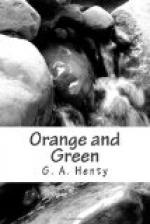The king made his approaches to the city slowly, being obliged to level the numerous inclosures as he moved on. These were occupied by the Irish infantry, who, lining every hedge, kept up a galling fire, falling back gradually as heavy bodies of troops were brought up against them, until they reached the cover of the guns of the city and fort. Upon these opening fire, William’s army halted and encamped before the Irish town.
Here, as at the Boyne, the king had a narrow escape, a cannonball from the walls striking the ground at his foot as he was passing through a gap in a hedge.
The king had learned that great dissensions existed between the Irish and French, and relied upon this, as much as upon the strength of his arms, to obtain possession of the city. His information was, indeed, correct. King James, in his flight, had left no orders as to who should assume the supreme command. The Duke of Berwick had considerable claims. Lauzun and the French officers declined altogether to receive orders from Tyrconnell, and the Irish officers equally objected to act under the command of a Frenchman. Consequently, during the whole siege, the main Irish army, which, by acting upon William’s rear, could speedily have made his position untenable, remained inactive. Monsieur Boileau, a French officer, was governor of the town, but Lauzun, having examined the fortifications, pronounced the place wholly incapable of defence, declaring that the walls could be knocked down with roasted apples, and so ordered the entire French division to march to Galway, and there await an opportunity for embarking for France, leaving the Irish to defend the city if they chose.
Lauzun, in fact, was a courtier, not a soldier. He desired to get back to Versailles at any hazard, and had so inspired his officers and men with his own sentiments that there was a general cry among them to be recalled to France. They had, indeed, no interest in the cause in which they fought. They looked with contempt at their half-armed and half-trained allies, and they grumbled continually at the hardships which they had to undergo. It was indeed an evil day, for King James’s cause, when he exchanged Mountcashel’s fine division for these useless allies, who, throughout the war, not only did no service, but were the cause of endless dissension and disaster.
As soon as King William had taken up his position in front of Limerick, he sent a summons to Boileau to surrender. The latter consulted with Tyrconnell, Sarsfield, and some other officers, for, even to the last moment, it was a question whether the place should be defended.
At last, however, a decision was made. The reply was addressed to William’s secretary, Sir Robert Roultwell, as Boileau could not acknowledge the prince as king, and was too polite to hurt his feelings by a denial of the royal title. He expressed great surprise at the summons he had received, and said that he hoped to merit the good opinion of the Prince of Orange better by a vigorous defence, than by a shameful surrender, of the fortress which had been committed to his charge by his master King James the Second.




